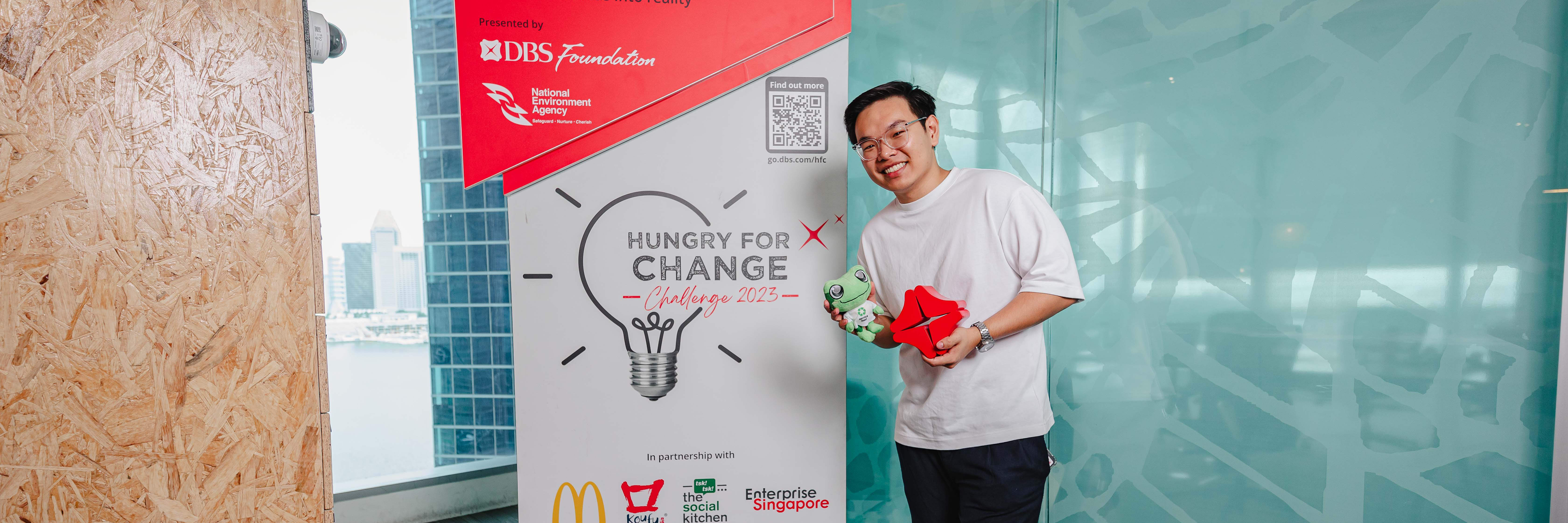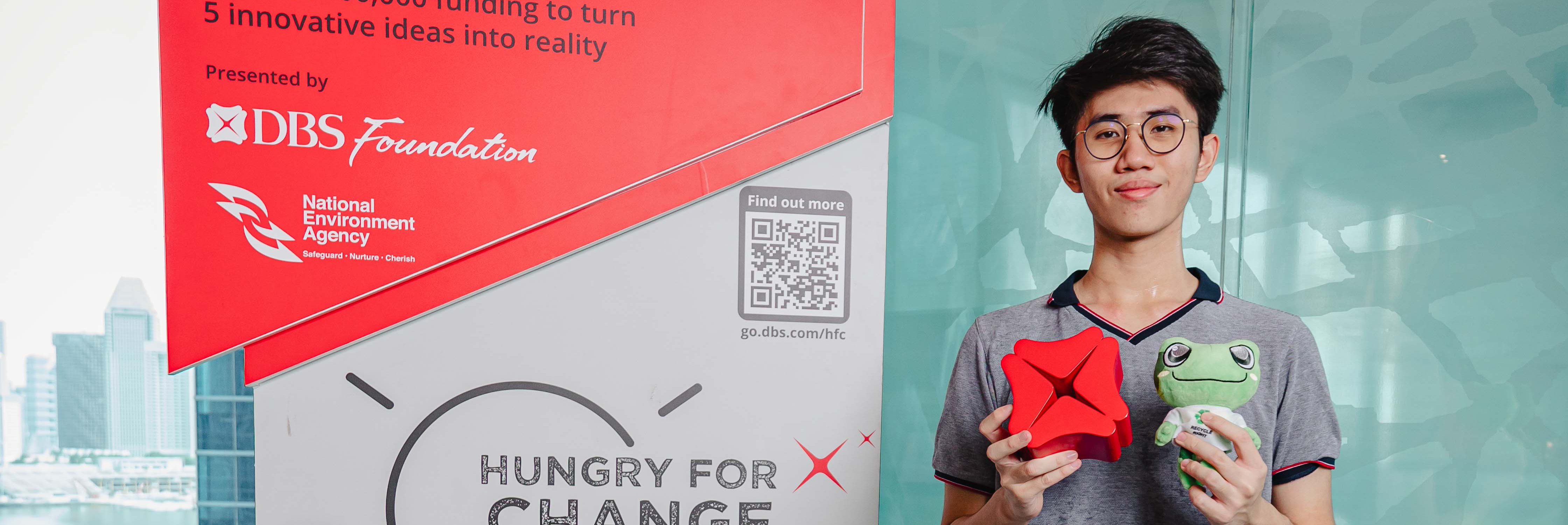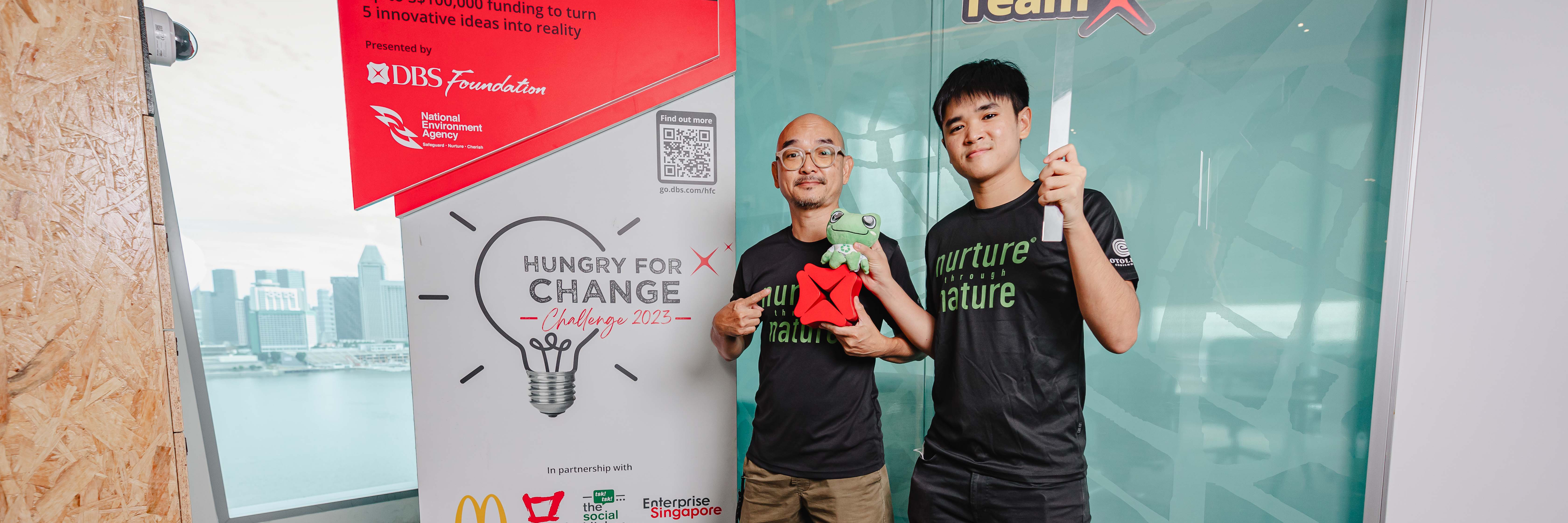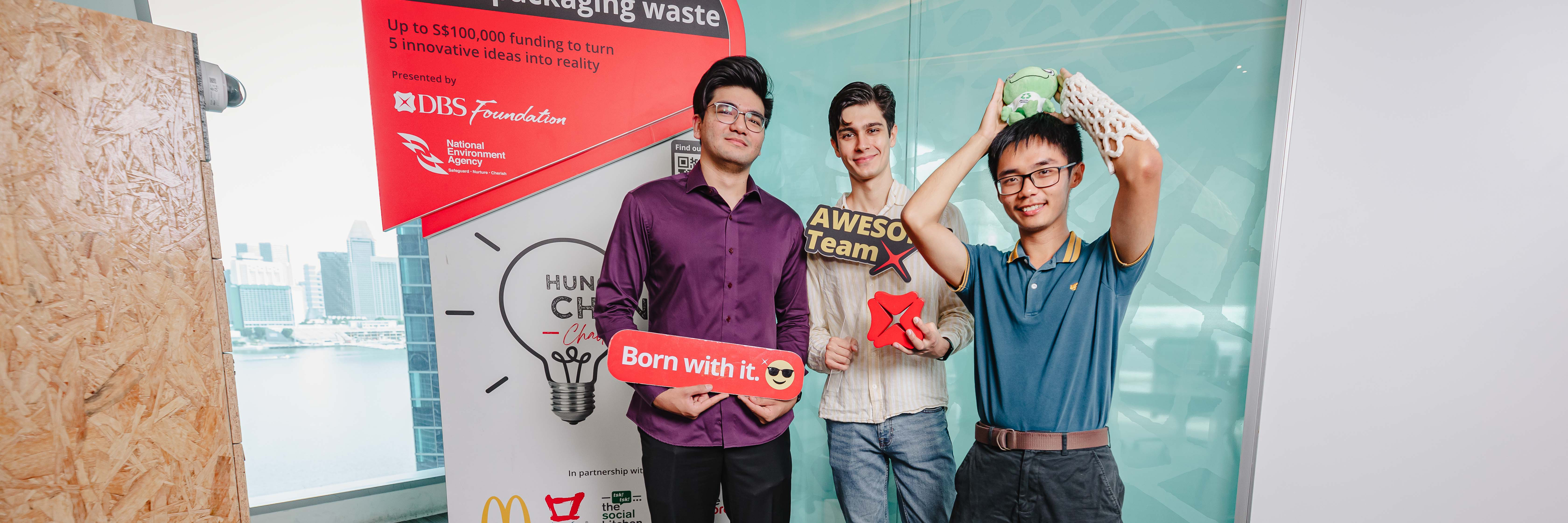Hungry for Change Challenge 2023
DBS Foundation and the National Environment Agency (NEA) launched the inaugural Hungry for Change Challenge to empower individuals to develop and pilot innovative solutions that will prevent and/or reduce food waste in Singapore.
In the latest edition, we partnered Koufu, McDonald’s and The Social Kitchen to co-develop the challenge’s problem statements with the aim of helping each partner find innovative solutions to manage their food and food packaging waste.
Our winning solutions!
In 2022, Singapore generated 813,000 tonnes of food waste. However, only 18% of the food waste which comprised mostly homogeneous by-products from food manufacturing processes, was recycled. The remaining food waste was incinerated at waste-to-energy plants with other types of general waste. On top of that, packaging makes up about one-third of domestic waste disposed of in Singapore. However, packaging is a critical component to protect and extend the shelf-life of food during processing, transport and retail.
Our winners looked at these issues closely, and came up with innovative ideas, backed by impressive dedication to reimagine and reduce food and packaging waste.
Problem statements
- Give food waste a second life
Majority of food waste in Singapore is incinerated when it could have been recovered for other uses such as upcycling to food, animal feed or non-food products.
How can we reduce food waste by converting it into other useful forms?
- Segregate food waste effectively
By segregating food waste from other types of waste, we can minimise contamination from other non-food substances.
How can we properly segregate food waste so that it remains suitable for recycling and upcycling?
- Reduce food waste from farm to table
Opportunities to reduce food waste exist at every step along the supply chain from farm to table.
What are some innovative ways to do this?
- Develop innovative food packaging solutions
Packaging is a critical component to protect and extend the shelf-life of food during processing, transport and retail.
How can we design packaging to be multi-functional and up-cyclable to ensure circularity?
- Minimise the use of food packaging
Packaging is necessary as it holds and protects our food. However, it forms a considerable proportion of total waste adding strain to our waste management systems.
How can we reduce the use of food packaging?
Information sessions
Two insightful information sessions were held on 12 and 13 September 2023 with our three corporate partners, Koufu, McDonald’s and The Social Kitchen. Information about their food waste and packaging waste concerns was shared and questions posted by participants during the sessions were also addressed in-depth.
For more details, please download the presentation shared during the information sessions and the summary of discussion at the links below.
| Files | Download Links |
|---|---|
| Hungry for Change Challenge 2023 Information Session Presentation | Download |
| Hungry for Change Challenge 2023 Information Session Summary of Discussion | Download |
About the Hungry for Change Challenge
DBS Foundation and the National Environment Agency (NEA) launched the inaugural Hungry for Change Challenge to empower individuals to develop and pilot innovative solutions that will prevent and/or reduce food waste in Singapore.
This year, the five most innovative and impactful ideas around reimaging and reducing food and packaging waste will receive total funding of up to SGD 100,000 from DBS Foundation. An additional SGD 25,000 will be given to the most promising solutions of the five at the end of their pilot.
The teams will also receive mentorship from DBS and have opportunities to consult with NEA and our corporate partners and benefit from their expertise.
The winning teams will be selected after two rounds of evaluation – Qualifying Round and Pitch Day – based on the criteria of Innovation (20%), Feasibility and Scalability (20%), Implementation (30%) and Impact (30%).
Eligibility criteria
The DBS Foundation x NEA Hungry for Change Challenge is open to current students and alumni of not more than 5 years from institutes of higher learning in Singapore:
- “Current Student” is defined as any person who is enrolled in either full-time or part-time (excluding short term courses) at ITE, polytechnic, undergraduate, postgraduate, or PhD programme at a Singapore tertiary institute.
- “Recent Alumni” is defined as any person who graduated or left school or took a sabbatical after 1 January 2019.
Each team must have at least four members, and at least one of the members must be a current student or recent alumni.
We welcome solutions from all disciplines, including design, behavioural interventions, technology innovations and business solutions. Teams are encouraged to include elements of community outreach and/or engagement as part of the suite.
As the Challenge aims to empower teams to pilot their ideas and solutions, teams are strongly encouraged to solicit guidance and support of faculty members from their institute of learning as mentors or advisors.
Evaluation Process
There will be two evaluation rounds:
- Qualifier
Up to 15 teams will be selected to present to an evaluation panel where up to 10 teams will be shortlisted for Pitch Day.
- Pitch Day
The judging panel will decide on five winning teams that will receive up to $20,000 each to pilot their solutions with the respective corporate partner.
The submissions will be evaluated based on the following criteria:
| Criteria | Details | Weightage |
|---|---|---|
| Innovation | Is the proposed idea or solution new and what is the unique value proposition? How does the proposed idea or solution compare to the next best alternative? | 20% |
| Feasibility and scalability | Is the idea or proposed solution technically feasible and can be piloted within the next 6 months? Is the idea or proposed solution scalable and, where relevant, have a reasonable chance to be developed as a finished product or service after the pilot, from a technical and economical point of view? | 20% |
| Implementation | Does the team possess good understanding of the food and packaging waste issue and a clear and feasible implementation plan for pilot? Does the team demonstrate the ability and capabilities to develop their idea or proposed solution into pilot and beyond? | 30% |
| Impact | Does the idea or proposed solution deliver a significant and measurable impact (e.g., environment, social) in addressing the food waste and packaging issue? Does the idea or proposed solution include elements of community engagement/outreach to change behaviour and mindset? Does the team have in place processes to track and report impact created? | 30% |
Past Winners
Young and hungry to change the world, these youth entrepreneurs are tackling Singapore’s food waste issue! Out of 60 applicants, these five winning teams of the inaugural challenge are scaling their zero waste solutions with mentorship and funding support from DBS Foundation and the National Environment Agency of Singapore.

Food Waste Valorisation
Technological Solutions
Be part of the discussion
Have questions or would like to collaborate with us? Reach out to us at dbsfoundation@dbs.com.
Presented by


In partnership with:




In support of






















Thank you for your feedback
Let us know how this article helped:We're sorry to hear that.
We're sorry to hear that